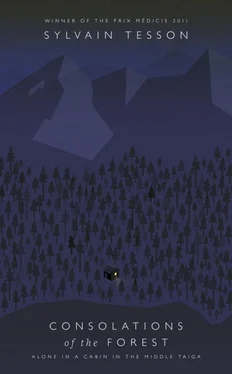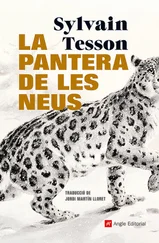21 FEBRUARY
It’s −26°F. Crystalline sky. In cold winters in Norway, water freezes into huge castles around waterfalls, and like the ceiling of the ice palace in the novel by Tarjei Vesaas, the Siberian winter is sterile and pure.
Yesterday’s idiots have trashed everything. They’ve trampled the drifts and left their mark all over. I won’t have peace until a snowstorm reupholsters the lakeshore.
About fifty yards south of my cabin is a banya , the Slavic version of a sauna. This one is sixteen by sixteen feet and heated by a stove. Volodya built it last year. It takes four hours to reach 175°F. The banya illustrates the Russian’s contempt for temperance. The body swings without transition from fire to ice. After cooking for twenty minutes, I go outside where it’s now −22º and all that heat evaporates, so with my skull in a vice of ice, I have to go back inside. The banya, allegory of our lives spent in the perpetual pursuit of improvement. We push through the door, thinking to reach happiness, but quickly head back where we came from, which soon oppresses us afresh.
In Russia people take refuge in the banya once or twice a week to rid themselves of toxins. The heat squeezes the body like a lemon. All rancour dissolves. Bad fat, dirt and alcohol seep out.
A storm blows in at six in the evening. Naked in my felt boots, I trudge back to the cabin, kerosene lantern in hand. I still remember the story of those zeks in the gulag who went out to piss one night in a blizzard. They got lost, couldn’t find their way back to the shelter, and were found dead in the morning fifty yards from the barracks. I drink down a quart of piping hot tea. The banya: absolute luxury. I’m a new man. Give me a shovel and a red silk scarf and I’d build socialism.
In the evening, a bowl of rice au Tabasco , half a sausage, a pint of vodka, and for dessert the moon up over the mountains, trundling its tristesse . I go outside to salute the big maternal ball that watches over the sleep of hermits, then go to bed full of pity for animals that have no cabin or banya. Or burrow.
22 FEBRUARY
Life in the forest: escapism? That’s how people mired in routine disparage the vital, creative force of life. A game? Absolutely! What else would you call willingly staying alone on a lakeshore by a forest with a crate of books and some snowshoes? A quest? Too big a word. An experiment? In the scientific sense, yes. The cabin is a laboratory, where you precipitate your longings for freedom, silence and solitude. An experimental field where you invent a slowed-down life for yourself.
The theorists of ecology extol de-growth. Since we cannot continue to aim for endless growth in a world of increasingly scarce resources, we ought to decelerate our rhythms, simplify our existence, reconsider our requirements on the downswing. We can accept these changes of our own accord. Tomorrow, economic crises will force them upon us.
De-growth will never be a political option. Only an enlightened despot could impose such a remedy, and what leader would be brave enough to try? How would he convince his people of the virtue of asceticism? And persuade billions of Chinese, Indians and Europeans that it’s better to read Seneca than to gobble cheeseburgers? The waning utopia: a poetic recourse for those seeking better living through dietetics.
The cabin is a perfect terrain in which to build a life founded on luxurious sobriety. The sobriety of the hermit is not to encumber yourself with either objects or your fellow man. And to break the habits of your former needs.
The luxury of the hermit is beauty. Wherever you look, there is absolute glory. The parade of hours is uninterrupted (aside from yesterday’s contretemps). Technology does not imprison you within its circle of fire through the needs it creates.
Retreating to the forest cannot be everyone’s course. Eremitism is elitism. Aldo Leopold says as much in his A Sand County Almanac , which I began rereading this morning right after lighting the stove: ‘All conservation of wildness is self-defeating, for to cherish we must see and fondle, and when enough have seen and fondled, there is no wilderness left to cherish.’ When crowds enter the forests, it’s to chop them down. Life in the woods is no solution to ecological problems. The phenomenon contains its own counter-principle: the masses, taking to the woods, would bring along the evils they’d hoped to flee by leaving the city. No exit.
A blank day. A fisherman’s truck in the distance. Long conversation with my window. In late morning I toss a half-dozen bottles of Kedrovaya into a snowbank. I’ll find them again in three months, at the spring thaw. Their necks will peek out of the snow, announcing better weather more surely than snowdrops. Winter’s present to the eternal return of spring.
An afternoon of repairs and tidying up. I finish sorting through the crate of provisions and waterproof the cabin’s porch roof by nailing up some planks. But afterwards? When there are no more planks to nail up or things to put away?
The sun disappears at five behind the mountaintops. Shadows take over the clearing and the cabin grows dark. I find an immediately effective remedy for anguish: a short stroll on the ice. A simple glance at the horizon convinces me of the strength of my choice: this cabin, this life. I don’t know if beauty will save the world. It saves my evening.
23 FEBRUARY
Journey into the Whirlwind is the English title of Eugenia Ginzburg’s story of her years in the gulag, but in French it’s called Le Vertige , vertigo. I read a few pages in the warmth of my sleeping bag. When I awaken, my days line up, eager virgins, offered in blank pages. And I have dozens of them in reserve. Each second of them belongs to me. I’m free to dispose of them as I will, to make them into chapters of light, of slumber or of melancholy. No one can change the course of such an existence. These days are creatures of clay to be modelled. I am the master of an abstract menagerie.
I was familiar with the vertical vertigo of the climber clinging to the cliff in terror at the sight of the abyss. I remembered the horizontal vertigo of the traveller on the steppe, staggered by vanishing perspectives. I’d experienced the vertigo of the drunkard who thinks he’s come up with a brilliant idea that his brain just won’t process even though he can sense it growing within him. And I discover the vertigo of the hermit, the fear of the temporal void. The same pang of distress as on the cliff – only not for what lies below, but for what lies ahead.
I am free to do anything in a world where there is nothing to do. I look at the icon of Seraphim. He had God.
God, never sated with the prayers of men, is a helluva pastime. Me? I have writing.
A walk on the lake, after my morning tea. The constant severe cold has the thermometer in its grip, so the ice has stopped cracking. I head out onto the lake. In the snow, with a stick, I trace the first poem in a series of ‘snow haiku’:
Footsteps dot the snow
Walking sets short black stitches
Into the white cloth
The advantage of poetry inscribed in the snow is that it will not last: verses carried off by the wind.
A mile and a half from the lake’s edge, a fault has split the ice. Translucent blocks straddle the fracture, a stripe that darts off parallel to the shoreline. Gurgling wells up from the opening: Baikal is suffering. I walk along the wound, at a distance, for the slightest misstep would slip me underwater.
Suddenly I can picture those dear to me: through the mysterious mechanics of memory, faces spring to mind. Solitude is a country inhabited by the remembrance of others; thinking of them is a comfort in their absence. My dear ones are there, enfolded in memories. I see them. Orthodox Christians believe that Being becomes present in the image. God’s essence flows down into the substance of icons, incarnate in glowing oil paint. The picture is transmuted.
Читать дальше












